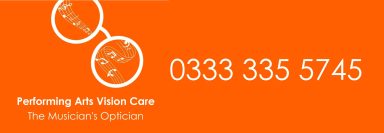
Eye disease and the performer
Extending your performing arts career beyond your diagnosis
Coping with career threatening visual impairment
Age-related macular degeneration
Each stage of this degenerative eye disease presents unique challenges. Geographic atrophy (GA) can impair a musician's note-reading skills. Cataracts, which affect many over 50, cloud the eye lens, making sheet music and stage directions difficult to see.
Performing artists can be distressed by these conditions' vision impairment. Imagine following an autocue or intricate dance notation with poor vision. Maintaining our art's precision and fluidity requires more than seeing.
Performers, especially musicians, can be distressed by visual field loss. Consider AMD. Each stage of this degenerative eye disease presents unique challenges. Drusen, small yellow deposits in the macula, impair central vision early on. Wet AMD, caused by leaky blood vessels, causes blind spots and distortions. This can make reading sheet music and seeing instrument keys difficult for musicians.
AMD can lead to geographic atrophy (GA), which thins and loses macula cells. This further impairs a musician's notation reading, potentially ending their career.
Still, there is hope. Modern lens technology addresses these unique issues. High-contrast filters improve visibility and sheet music detail, while yoked-prism lenses bend light to avoid macular damage and help performers use their remaining vision.
Performers with AMD need tailored solutions, including VR magnifiers and special lighting. Musicians with vision issues can continue their careers by embracing these advances and finding support groups.
Glaucoma
Recent studies suggest high-impedance wind instrument players could develop glaucoma. The Valsalva manoeuvre raises intraocular pressure by blowing into these instruments. This increase is felt more by high-resistance wind players.
Wind musicians with high resistance lose less vision. Due to lifetime playing time, their IOPs are high. Long-term, intermittent high IOP may damage cells and cause glaucoma.
Due to these challenges, wind instrumentalists need specialised vision care and optical corrections. Regular, customised eye exams can detect glaucoma and other vision issues early. As eye care professionals we tailor our solutions to musicians' needs to help them perform well without worrying about their vision.
Cataracts
As performers, your eyes are your most valuable tools, and maintaining optimal vision is crucial for your career. Cataracts, a common age-related condition, can significantly impact your ability to perform, particularly when it comes to sight-reading. The crystalline lens in your eye functions much like a camera lens, focusing light onto the retina for visual processing. When collagen builds up on this lens, it forms cataracts, clouding your vision and potentially jeopardising your performance.
Musicians, in particular, tend to notice the effects of cataracts earlier than the general population. This is because cataracts can cause blurred patches or discoloured areas across music manuscripts, making it challenging to read notes, accidentals, dynamics, or even key signatures accurately. For dancers, dance notation may appear blurred, while production staff might struggle with viewing computer screens.
Performers require specific visual skills that cataracts can compromise:
1. Rapid changes in focus: Musicians need to swiftly shift focus between their music stand, the conductor, and other ensemble members. Cataracts can make the lens stiff, affecting its flexibility and ability to change focus quickly.
2. Vision fixation: The ability to read sheet music, regardless of tempo, can be severely affected by the blurring, glare, and patchy vision caused by cataracts.
3. Peripheral vision: Orchestra players must be able to see their stand partner or section members even when unable to move their head due to their instrument. Cortical cataracts, in particular, can severely compromise this ability.
Given these unique visual demands, it's clear that performers, especially musicians, require bespoke vision care. Early detection and treatment of cataracts can help maintain the visual acuity necessary for peak performance. Don't let cataracts dim your spotlight – seek specialised eye care to ensure your vision remains as sharp as your talent.
If you are a performer struggling to continue your passion contact us today.
©Copyright. All rights reserved.
We need your consent to load the translations
We use a third-party service to translate the website content that may collect data about your activity. Please review the details in the privacy policy and accept the service to view the translations.
